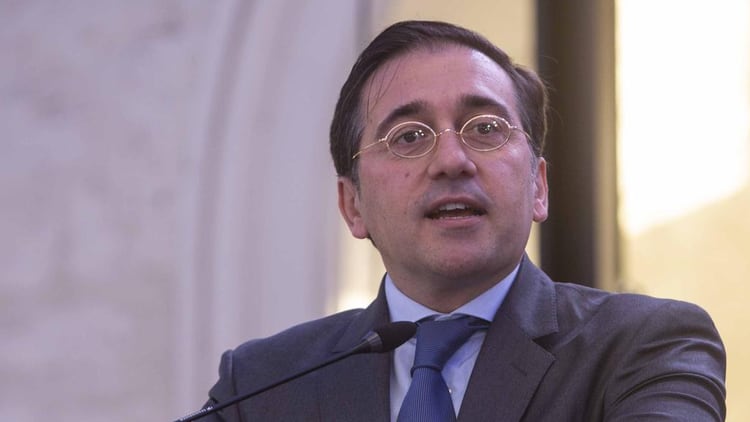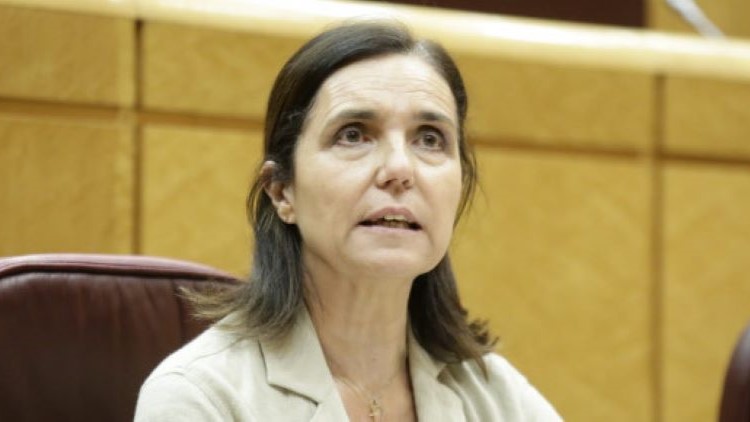The Diplomat
The PP parliamentarians did not attend yesterday’s meeting with Spanish MEPs at the European Parliament’s headquarters in Strasbourg by the Minister of Foreign Affairs, José Manuel Albares, thus confirming the stand-off they had announced last week.
Albares had summoned the Spanish MEPs from the different groups to present the agenda of the Spanish Presidency of the EU in the second half of the year, but the PP had conditioned his presence in a letter to the minister on a prior meeting between the head of the Spanish government, Pedro Sánchez, and the leader of the opposition, Alberto Núñez Feijóo.
In statements to journalists, the head of the PP delegation in Europe, Dolors Montserrat, insisted yesterday that they would not be present at the meeting, because the PP hope that “Sánchez will meet with Feijoo as soon as possible to work together on the priorities of the presidency”. He added: “In Europe they see it as a democratic anomaly that the President of the Government does not explain to the leader of the opposition the axes and objectives of the Spanish presidency”.
“They are late because there are only 75 days left until the presidency and this does not belong to Sánchez, it belongs to all Spaniards,” Monserrat said, after assuring that the government “prefers to meet with Bildu” rather than sit down with the ‘popular’ party and criticising the fact that her letter has not received a response from Albares.
When asked by journalists, Albares reproached the PP for its attitude, saying: “I believe that the Popular Party is always wrong and on this occasion it has been wrong again. There are times when you have to be the opposition, but there are times when you have to be Spain”.
The minister organised a round of contacts with Spanish MPs, which was attended by MPs from PSOE, Ciudadanos, Vox, ERC, Podemos, IU, PNV and BNG. Apart from the PP,
Earlier, Albares met with German Social Democrat Bernd Lange, Green MEP Terry Reintke and EPP member Salvatore De Meo of Forza Italia. Popular sources, quoted by Europa Press, pointed out that the minister asked for a meeting with the president of the European PP, Manfred Weber, who rejected the meeting.
In the morning, in Madrid, the Foreign Affairs Minister, together with the Vice-President of the European Commission for Democracy and Demography, Dubravka Suica, inaugurated a Civil Society Forum, the aim of which is to incorporate relevant personalities from Spanish society in the preparation of the EU Presidency.
At the event, Albares pointed out that the Government has not yet defined the priorities of its Presidency of the EU, although it does have the “general outlines” of the Presidency. According to the minister, “it is still too early to have defined priorities”, because, in general, he explained, the rotating presidencies move them “a few weeks beforehand, especially in this complex and volatile context where everything changes so quickly, where we have to deal with previously unthinkable situations” such as COVID-19 or now the war in Ukraine.
Albares reiterated that the Government sees the EU Presidency as “a country project”, as was the NATO Summit, and therefore wants to “involve all actors in Spanish political life” so that they can enrich it with their contributions.
The minister indicated that the general lines that the government has set itself include climate change, digital transition, “the deepening of social Europe, tackling the economic and social consequences of the war” in Ukraine, starting with the “energy challenge”, as well as other issues such as access to housing, ageing, depopulation, disability and food security.
Albares highlighted the fact that Spain is taking over the rotating Presidency for the fifth time, and said that the rest of the European partners are “waiting for the Spanish Presidency”. “This is a very definitive moment for Europe” in which leadership is needed, he said.
Dubravka Suica congratulated Spain on being the first country to organise a space for debate such as the Forum they were inaugurating, before the start of its rotating presidency.
“If there is no robust and vibrant civil society, there is no vibrant democracy,” she said, welcoming the fact that the forum would bring together representatives of trade unions, business organisations, NGOs and other groups from the world of culture, science and sport.







